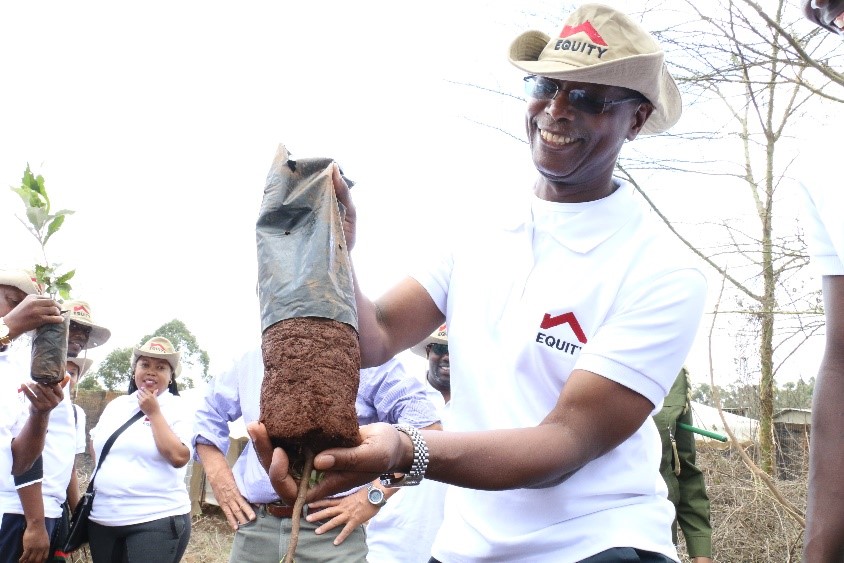
With the COVID-19 pandemic taking a toll on the world, it has resulted in a widespread global health crisis involving loss of life, human suffering, and a negative influence in the global economy. So far, there are over two million confirmed cases globally, and the number keeps on increasing every minute.
Countries have therefore put up measures in a bid to prevent, counter, or reduce the spread of the virus, including travel bans from outside countries and lockdowns. The lockdown and related measures implemented by countries have also led to a reduction in economic activities, industrial activities, and a drop in road transport, thus decreasing levels of toxic wastes, especially the air pollutants. This has resulted in clearer skies experienced in several countries and cities in the world.

One phenomenon example is the stunning picture of Mount Kenya taken from Nairobi. The second highest mountain in Africa with an altitude of 17,057 feet can suddenly be seen from about 137 kilometres. The same case is also happening in North India. Residents can be able to see the Himalayas Mountains, a distance of over 200 kilometres away, for the first time in 30 years.
Through this pandemic, albeit, it’s now clear that all kinds of pollution and environmental
degradation is real and its impacts are a threat to the majority of the world’s population. The world has also realized the need for environmental conservation, knowing very well the positive impact it will have in the long run.
In Kenya, the government, alongside other organizations and groups, have always stepped up to address and come up with ways to protect and conserve the environment. These bodies include UNEP, Green Belt Movement, William Holden Wildlife Foundation, and Ecotourism Kenya.
The Kenyan government, through its most notable government bodies Kenya Forest Service KFS, the National Environmental Management Authority (NEMA), and the presidency, had earlier on declared its intention to plant 2 billion trees within the next three years. This is in a bid to increase the country’s contribution to addressing climate change.

Equity Group, as a corporate citizen, has not been left behind either as it has recently engaged in activities that contribute to the drive towards environmental conservation in the country.
One major milestone was on 22nd October 2019 during the Group’s 35th Anniversary celebration, where it announced plans to implement an ambitious project to plant 35 million trees across the country. The Group has partnered with Kenya Forest Service (KFS) in this noble initiative. KFS’ mandate is to provide technical support including the identification of hotspots that require urgent tree cover and rehabilitation of degraded forests, mapping out agro-ecological zones and identification of suitable
tree species for planting. The body also identifies high-quality tree seedlings stocks across the country, and supervises the proper planting and maintenance of the trees.
Led by the Group CEO and Managing Director, Dr. James Mwangi and Equity Kenya Board Chairman Prof Isaac Macharia, Equity kick-started the project by planting 3,500 indigenous tree seedlings in Miotoni Forest Block, which is part of the Ngong Forest Complex.
“At Equity, we are very keen on promoting sustainable finance by concentrating on People and Planet as we conduct our business. In an effort to conserve the environment, we have partnered with Kenya Forest Service (KFS) to promote Farm Forestry Initiatives – this spirit of public-private partnerships (PPP) is from the fact that agriculture activities cause 77 % of deforestation and land degradation, hence the need to work closely with forest and farm producers to encourage them to adopt sustainable solutions for preserving natural environments,” said Dr. James Mwangi.
He also added that the 35 million trees to be planted would represent 1 million trees for each year since the Equity began its operations in Kenya.
Also, on 13th November 2019, in partnership with Meru University of Science and Technology, Equity planted 40,000 indigenous and exotic tree seedlings on 32 acres of land within the university led by the university Chancellor, who doubles up as the Equity Group CEO and Director Dr. James Mwangi. That brought the total acreage under trees in the university to over 70 acres out of the total 540 acres representing a 13% forest cover.
Equity has other initiatives in the energy and environment space ongoing that have seen it plant more than 1 million trees in the Mau Water Tower.
Equity has also promoted the use of clean energy that reduces reliance on wood fuel, charcoal, and fossils fuels like kerosene as a source of energy. Eco-Moto, for instance, being the world’s first energy loan, helps one to purchase clean energy products with just a few clicks and taps on their mobile phone through Equitel or Eazzy Banking App. So far, Equity Bank has supported the distribution of over 137,501 clean energy products worth over US$ 6 million, with almost 700,000 individuals benefitting from clean energy products such as solar and clean cook-stoves. It has established a robust distribution network of high-quality renewable energy products throughout the country.

“There is an opportunity for us as a Group to scale-up the footprint of our contribution in greening the environment, supporting transitions to clean energy, and increasing fruit productivity. It is in this regard that we propose unlocking our infrastructure to leverage on ongoing and proposed government initiatives,” noted Dr. Mwangi.
Presently, Equity Bank Kenya has over 180 branches across the country, 46,000+ agents, 26,304 secondary school scholarship beneficiaries of the Wings to Fly and Elimu programs, 13,775 Equity Leadership Programme scholars and alumni in University, 8,000+ staff members, and over 14 million account holders including corporates. Equity will, without a doubt, successfully and sustainably run a sensitization and mobilization campaign to use this massive force to run a tree planting and maintenance exercise.
According to scientists, planting trees is one of the biggest and cheapest ways of taking CO2 out of the atmosphere to tackle the climate crisis. It is also fundamental to the survival of forest- dwellers and are important providers of ecosystem services, including maintaining, restoring soil fertility, protecting watersheds, and watercourses.


















